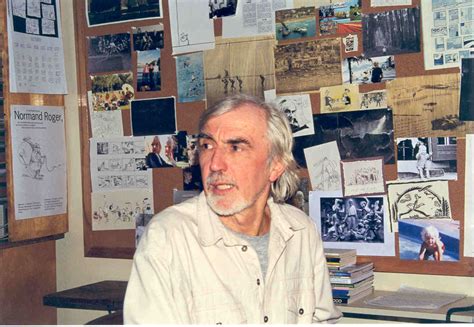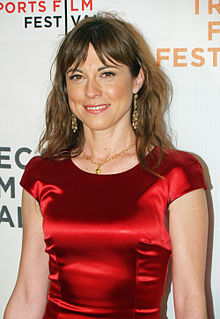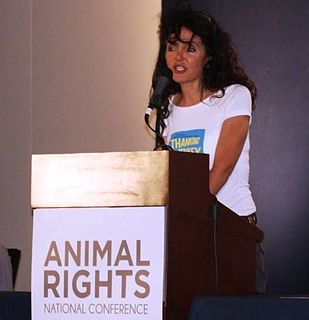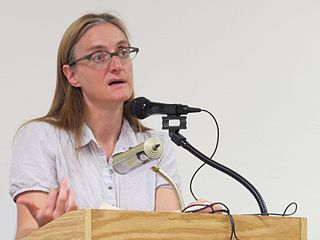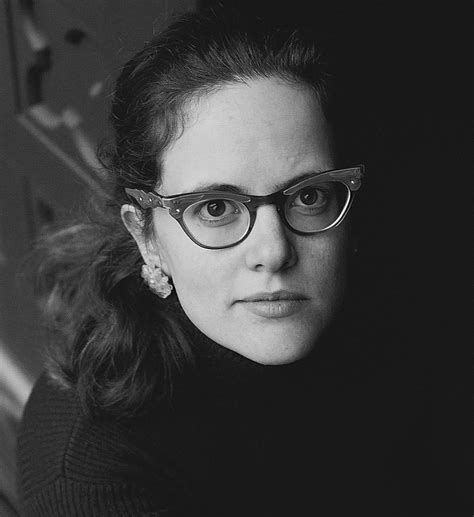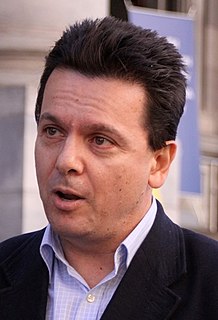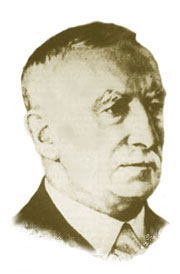Top 342 Farming Quotes & Sayings - Page 6
Explore popular Farming quotes.
Last updated on April 22, 2025.
An understandable hunger for potential clients tempts many [career counseling therapists] to overpromise, like creative writing teachers who, out of greed or sentimentality, sometimes imply that all of their students could one day produce worthwhile literature, rather than frankly acknowledging the troubling truth, anathema to a democratic society, that the great writer, like the contented worker, remains an erratic and anomalous event, immune to the methods of factory farming.
The fortunate and successful New Urbanists will be the ones who can find local infill projects in small towns and small cities associated with farming, water transport, (perhaps rail too) and water power. I do not believe personally that we will retrofit much of suburbia in the way many people wish we might. The capital won't be there, and I'm rather convinced that the population is headed down - though this will be a lagging effect, because even starving people have sex.
An author describing the methods of intensive farming, or the excesses of sport hunting, or even the harsher uses of animals in science writes with confidence that most readers will share his sense of concern and indignation. Sounding the call to action-convincing people that change is not only necessary, but actually possible-is more problematic. In protecting animals from cruelty, it is always just one step from the mainstream to the fringe. To condemn the wrong is obvious, to suggest its abolition radical.
Peak oil is already upon us. It is destroying our banking system, that is, our system for marshalling capital, and that is about to put us out of business-as-usual. So, we have to carry on with business-not-so-usual. This could mean anything from your children finding careers in farming (rather than show biz or plastic surgery) to reorganizing households differently to traveling from New York to Boston by boat.
Had today's technophobic zealots [environmental activists] been in charge in previous centuries, we would have to roll human progress back to the Middle Ages - and beyond, since even fire, the wheel and organic farming pose risks, and none would have passed the "absolute safety" test the zealots demand. Putting them in charge now would mean an end to progress, and perpetual deprivation for inhabitants of developing nations.
...there's no such thing as sustainability. There are just levels of it. It's a process, not a real goal. All you can do is work toward it. There's no such thing as any sustainable economy. The only thing I know that's even close to sustainable economic activity would be organic farming on a very small scale or hunting and gathering on a very small scale. And manufacturing, you end up with way more waste than you end up with finished product. It's totally unsustainable. It's just the way it is.
Most people no longer believe that buying sneakers made in Asian sweatshops is a kindness to those child laborers. Farming is similar. In every country on earth, the most human scenario for farmers is likely to be feeding those who live nearby-if international markets would allow them to do it. Food transport has become a bizarre and profitable economic equation that's no longer really about feeding anyone ... If you care about farmers, let the potatoes stay home.
There is no employing class, no working class, no farming class. You may pigeonhole a man or woman as a farmer or a worker or a professional man or an employer or even a banker. But the son of the farmer will be a doctor or a worker or even a banker, and his daughter a teacher. The son of a worker will be an employer - or maybe president.
I see young men, my townsmen, whose misfortune it is to have inherited farms, houses, barns, cattle, and farming tools; for these are more easily acquired than got rid of. Better if they had been born in the open pasture and suckled by a wolf, that they might have seen with clearer eyes what field they were called to labor in. Who made them serfs of the soil? Why should they eat their sixty acres, when man is condemned to eat only his peck of dirt? Why should they begin digging their graves as soon as they are born?
I envision a day when every city and town has front and back yards, community gardens and growing spaces, nurtured into life by neighbors who are no longer strangers, but friends who delight in the edible rewards offered from a garden they discovered together. Imagine small strips of land between apartment buildings that have been turned into vegetable gardens, and urban orchards planted at schools and churches to grow food for our communities. The seeds of the urban farming movement already are growing within our reality.
Once women invented farming, and began to keep and breed animals, they discovered the crucial function of the rooster and the henhouse. Fathers suddenly gained a function, and could do what only women had been able to do for all those millions of years--point at a child and say, "That is my son," "That is my daughter." Patriarchy quickly followed, beginning about five thousand years ago; a very short time in the development of our species, but covering all of recorded history.
Increasingly, we will be faced with a choice: whether to keep the oceans for wild fish or farmed fish. Farming domesticated species in close proximity with wild fish will mean that domesticated fish always win. Nobody in the world of policy appears to be asking what is best for society, wild fish or farmed fish. And what sort of farmed fish, anyway? Were this question to be asked, and answered honestly, we might find that our interests lay in prioritizing wild fish and making their ecosystems more productive by leaving them alone enough of the time.
The dance is the most universal of the arts, since, as Goethe justly said, it could destroy all the fine arts. It is an expression of all the emotions of the spirit, from the lowest to the highest. It accompanies and stimulates all the processes of life, from hunting and farming to war and fertility, from love to death. It enables, in turn other arts to come into being: music, song, drama. Despite all their riches, the dance is no formless complex, but a simple unity.
There I was out in the barn playing midwife to a pregnant mare. I remember sitting there, spinning yarn in the light of a little oil lamp, a city girl who knew nothing about farming, sitting on the deel beside that mother in pain, already beginning the birthing process. All around me there was darkness and perfect silence, except for the mother's pain. It was as if the war didn't exist in those hours.
The biggest thing right now, is supporting the people who take care of the environment. We must take care of the people who take care of the land. And so, if 20% of the population is in school, and they are asked to buy this food from farms. I mean at the real cost without a middleman, it could be amazing. It could change farming overnight.
The people who benefit from this state of affairs have been at pains to convince us that the agricultural practices and policies that have almost annihilated the farming population have greatly benefited the population of food consumers. But more and more consumers are now becoming aware that our supposed abundance of cheap and healthful food is to a considerable extent illusory.
Some of us seem to be born with a drive to try to make the world kinder. In my twenties, living in New York City, I worked in a soup kitchen every Sunday for many years, just trying to do my part. Then I read Animal Liberation and learned about factory farming and the killing of animals for oven cleaner and realized nobody needed my help as badly as the animals did.
When farming became a corporate venture, and the distribution of food became corporate, the variety of foods that were considered good diminished greatly. I know that there's a lot of misconception about this, that people think we have more food variety than ever before, but, in fact, if you read any of the studies, you'll find we have fewer foods than before.
The idea of hunting and gathering as the best way for life has become quite popular recently, much more populare in some circles than the idea of simple farming as the best way of life. Many of the new primitives regard the beginnings of agriculture as one of humanity's major steps in the wrong direction. Most of the people who are drawn to such ideas do their actual hunting and gathering in grocery stores, but the *feeling* is there; it takes the form of a religion...expressed by particpating in American Indian rituals - or primitive-style rituals that are created anew.
[My father] did get enough money to buy mules. We didn't have tractors, but he bought mules, wagons, cultivators and some farming equipment. As soon as he bought that and decided to rent some land, because it was always better if you rent the land, but as soon as he got the mules and wagons and everything, somebody went to our trough - a white man who didn't live very far from us - and he fed the mules Paris Green, put it in their food and it killed the mules and our cows.
Two hundred years ago, we were all busy farming and we all had a role to play. The home was a unit of production. We made food and all the things we needed, we took care of our kids and were connected to purpose in our evolution. When the Industrial Revolution came along, it took away a lot of the work the men had done.
And above all, above all, honest work must be rewarded by a fair and just tax system. The tax system today does not reward hard work: it penalizes it. Inherited or invested wealth frequently multiplies itself while paying no taxes at all. But wages on the assembly line or in farming the land, these hard-earned dollars are taxed to the very last penny.
We need to realize that these industrial methods of farming have gotten us used to cheap food. The corollary of cheap food is low wages. What we need to do in an era when the price of food is going up is pay better wages. A living wage is an absolutely integral part of a modern food system, because you can't expect people to eat properly and eat in a sustainable way if you pay them nothing. In fact, it's cheap food that subsidized the exploitation of American workers for a very long time, and that's always been an aim of cheap food.
I personally chose to go vegan because I educated myself on factory farming and cruelty to animals, and I suddenly realized that what was on my plate were living things, with feelings. And I just couldn't disconnect myself from it any longer. I read books like 'Diet for a New America' and saw documentaries like 'Earthlings' and 'Meet your Meat,' and it became an easy choice for me.
You go to towns in Massachusetts, Greenfield, first settled in 1686. Wouldn’t it be cool if it said, “Greenfield. First settled c. 13,000 B.P. or approximately 13,000 Before the Present. Resettled.” Maybe we could say even, “Resettled by whites,” Or, “Resettled anyway, 1686.” It would have a different impact. And of course it would help explain why the town is called Greenfield, because it was a green field and the fields were left by Native people who had already been farming them.
So, if people didn’t settle down to take up farming, why then did they embark on this entirely new way of living? We have no idea – or actually, we have lots of ideas, but we don’t know if any of them are right. According to Felipe Fernández-Armesto, at least thirty-eight theories have been put forward to explain why people took to living in communities: that they were driven to it by climatic change, or by a wish to stay near their dead, or by a powerful desire to brew and drink beer, which could only be indulged by staying in one place.
IT WAS TESS who told me about the crowd going to the all-night dance. We'd been school friends. We'd picked mushrooms and pretended to have seen a big ship. She had got married since I went away; it was a made match, a man from the midlands, a Donal, who had worked in a garage but took to farming, out all day, draining fields and callows so that he could till them and sow corn.
I don't know Hillary's Clinton stance on urban farming. I don't know Donald Trump's stance or Bernie Sanders's for that matter. But the Obamas have been amazing. You know, Michelle Obama, she planted that garden. She keeps bees there at the White House. Little known fact, though, is that Laura Bush also had an organic garden but she never told anyone about it.
We also look at farming. Are we making sure that we're getting the latest seeds out to women so they can get a bigger yield off of their farms? A new type of seed that gets out to a man, let's say, that's drought resistant - because, of course, the rains are changing in Africa with climate change - if you don't put it in the hands of a woman, she won't necessarily get it. We look at breaking down all those barriers.
For years now I've kind of operated under an informal shopping cycle. A bit like a farmer's crop rotation system. Except, instead of wheat, maize, barley, and fallow, mine pretty much goes clothes, makeup shoes, and clothes (I don't bother with fallow). Shopping is actually very similar to farming a field. You can't keep buying the same thing, you have to have a bit of variety. Otherwise you get bored and stop enjoying yourself.
[Y]our agricultural revolution is not an event like the Trojan War, isolated in the distant past and without relevance to your lives today. The work begun by those neolithic farmers in the Near East has been carried forward from one generation to the next without a single break, right into the present moment. It's the foundation of your vast civilization today in exactly the same way that it was the foundation of the very first farming village.
It is a fact that the entire Kentucky River system, which the central part of the state complacently depends upon for its future water, is deteriorating rapidly because of strip mining, because of bad farming, because of industrial and agricultural pollutants, because of urban sewage. It is deteriorating, that is to say, because almost nobody cares, or cares to know, where water comes from, so long as it keeps coming.
There are a few people out there with whom you fit just so, and, amazingly, you keep fitting just so even after you have growth spurts or lose weight or stop wearing high heels. You keep fitting after you have children or change religions or stop dyeing your hair or quit your job at Goldman Sachs and take up farming. Somehow, God is gracious enough to give us a few of those people, people you can stretch into, people who don't go away, and whom you wouldn't want to go away, even if they offered.
If you run for election with a particular agenda about saving jobs, about strengthening manufacturing and farming jobs, about tackling predatory gambling and making governments accountable, if there's an opportunity to achieve that agenda with either side of politics, particularly if you come from the political centre, then it's an opportunity you should take up.
I write my books to challenge my own feelings and theories. Perhaps most surprising was what I learned about rice farming. It was really interesting to think of how different Asian and Western cultures are as a result of the kinds of agricultural practices that our ancestors used for thousands of years. The life of a Chinese peasant in the Middle Ages was so dramatically different from the life of a European peasant - night and day different.
Of all the systems of the body - neurological, cognitive, special, sensory - the cardiological system is the most sensitive and easily disturbed. The role of society must be to shelter these systems from infection and decay, or else the future of the human race is at stake. Like a summer fruit that is protected from insect invasion, bruising, and rot by the whole mechanism of modern farming; so must we protect the heart.
The main characteristic of Nature's farming can therefore be summed up in a few words. Mother earth never attempts to farm without live stock; she always raises mixed crops; great pains are taken to preserve the soil and to prevent erosion; the mixed vegetable and animal wastes are converted into humus; there is no waste; the processes of growth and the processes of decay balance one another; ample provision is made to maintain large reserves of fertility; the greatest care is taken to store the rainfall; both plants and animals are left to protect themselves against disease.



